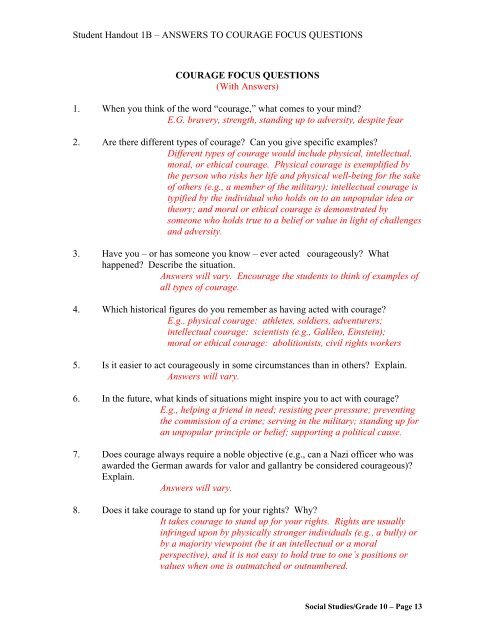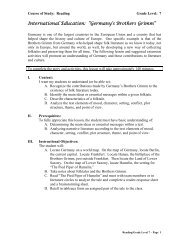US History I - Grade level 10 - Basque Country - Idaho State ...
US History I - Grade level 10 - Basque Country - Idaho State ...
US History I - Grade level 10 - Basque Country - Idaho State ...
Create successful ePaper yourself
Turn your PDF publications into a flip-book with our unique Google optimized e-Paper software.
Student Handout 1B – ANSWERS TO COURAGE FOC<strong>US</strong> QUESTIONS<br />
COURAGE FOC<strong>US</strong> QUESTIONS<br />
(With Answers)<br />
1. When you think of the word “courage,” what comes to your mind?<br />
E.G. bravery, strength, standing up to adversity, despite fear<br />
2. Are there different types of courage? Can you give specific examples?<br />
Different types of courage would include physical, intellectual,<br />
moral, or ethical courage. Physical courage is exemplified by<br />
the person who risks her life and physical well-being for the sake<br />
of others (e.g., a member of the military); intellectual courage is<br />
typified by the individual who holds on to an unpopular idea or<br />
theory; and moral or ethical courage is demonstrated by<br />
someone who holds true to a belief or value in light of challenges<br />
and adversity.<br />
3. Have you – or has someone you know – ever acted courageously? What<br />
happened? Describe the situation.<br />
Answers will vary. Encourage the students to think of examples of<br />
all types of courage.<br />
4. Which historical figures do you remember as having acted with courage?<br />
E.g., physical courage: athletes, soldiers, adventurers;<br />
intellectual courage: scientists (e.g., Galileo, Einstein);<br />
moral or ethical courage: abolitionists, civil rights workers<br />
5. Is it easier to act courageously in some circumstances than in others? Explain.<br />
Answers will vary.<br />
6. In the future, what kinds of situations might inspire you to act with courage?<br />
E.g., helping a friend in need; resisting peer pressure; preventing<br />
the commission of a crime; serving in the military; standing up for<br />
an unpopular principle or belief; supporting a political cause.<br />
7. Does courage always require a noble objective (e.g., can a Nazi officer who was<br />
awarded the German awards for valor and gallantry be considered courageous)?<br />
Explain.<br />
Answers will vary.<br />
8. Does it take courage to stand up for your rights? Why?<br />
It takes courage to stand up for your rights. Rights are usually<br />
infringed upon by physically stronger individuals (e.g., a bully) or<br />
by a majority viewpoint (be it an intellectual or a moral<br />
perspective), and it is not easy to hold true to one’s positions or<br />
values when one is outmatched or outnumbered.<br />
Social Studies/<strong>Grade</strong> <strong>10</strong> – Page 13
















